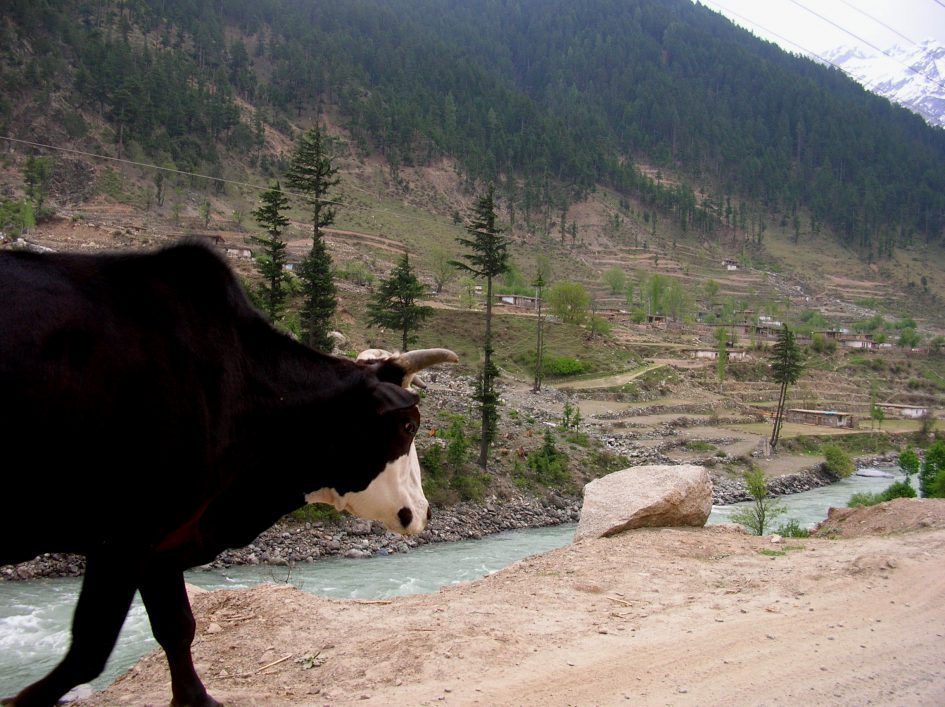a literary journal published by the Black Earth Institute dedicated to re-forging the links between art and spirit, earth and society

LAUNDRY
When I return to the States and show the photo of my apartment building in Cote d’Ivoire, West Africa, to friends and family, I’ll identify my place as the one that doesn’t have laundry hanging on the balcony. My apartment has a small room with a grungy deep sink and a space for hanging laundry, as I’m sure the others in the complex also do. I string my wet clothes here on the hope that they’ll be less accessible to the eggs of the flesh-boring tumba fly, even though on the balcony they would dry more quickly. My African neighbors apparently don’t fear the tumba fly; they use the balcony and also the courtyard, laying wet clothes across any available bit of bush or grass.
In Park Banco, a large forested area, punctuated by a dingy stream, a similar laundry enterprise takes place on a grand scale. Over fifty men and a few women ply their laundry trade in the stream, standing thigh deep in the water, beating the clothes against rocks and big truck tires. They use a soap which women make on the site from palm oil and which looks like slabs of slate-grey tofu. Once the laundry has been sufficiently tortured against the tires and rocks, the washers tote the heavy sopping load on their heads to their allotted spot of grass and lay the clothes out to dry. To become a washer, you pay a fee and in return receive a tire and a spot for washing and drying. The man who’s appointed himself as my guide says proudly that not a single one of these washers is Ivoirian; they’re mostly immigrants from Burkina Faso. They make maybe as much as five dollars a day. Their fee for washing a shirt, for example, is about twelve cents. Even that price seems high to me, given that their clients are not rich people but the poor who work such long hours that they have no time to do their own laundry. The guide assures me that the price is not exorbitant.
I watch a young man soap a carpet, its tapestry designs lost in foam. A woman pounds her load against a tire, a baby tied on her back, its head lolling to one side with her exertions. Other children run about, swimming or bathing naked. Women cook the washers’ lunch over small hordes of charcoal.
The washers gather their day’s load of laundry from clients, bear it here in old rice sacks which are now spread out to dry beside the stream. I wonder how the washers can possibly remember which shirt or pair of pants belongs to which of their clients. In the maze of humbler goods spread out across the grass, I’m surprised to find a t-shirt with a Calvin Klein logo. A few chickens roam among the clothes, a circumstance that clearly endangers whatever state of cleanliness they may have achieved after being thrashed in the polluted river. Still, I understand the clients’ faith in their washers. What water we have has been here since the beginning of the planet, polluted and cleansed again, over and over. What matters is that the clothes have been sent out soiled and returned dry. Money for services has been exchanged and therefore the returning laundry must be clean.
Author Biography:
Sibyl James is an adventurer who takes her readers with her—each page leads you around another bend in the road. James has an addiction for travel, a desire to experience other cultures, and a mission to make those cultures known to a U.S. audience. Her publications include seven books and works in over 100 journals internationally. She has received major awards for her writing from public foundations.
REPRINTED from The Last Woro Woro to Treichville: A West African Memoir. StringTown Press 2011.
©2026 Black Earth Institute. All rights reserved. | ISSN# 2327-784X | Site Admin